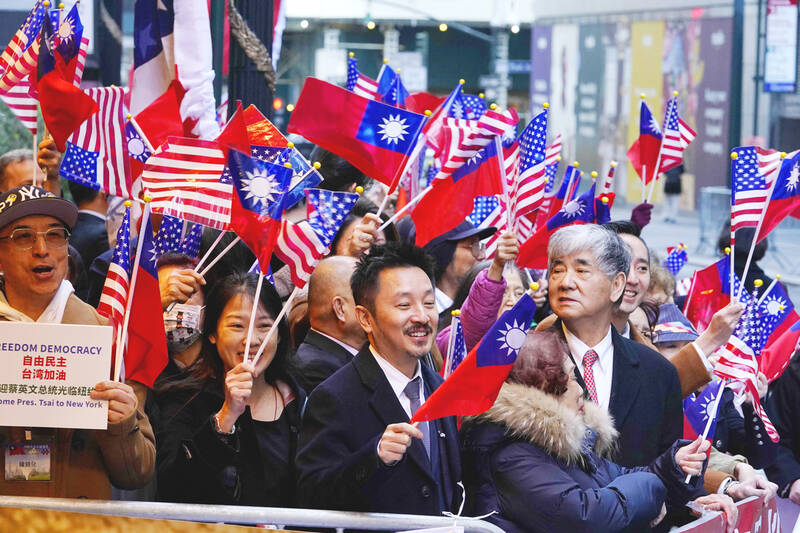Forty-seven percent of people in the US consider tensions between Taiwan and China a “very serious problem” for their country, while 66 percent said they view Taiwan positively, a Pew Research Center poll showed.
A report by the US-based think tank was released on Wednesday last week, comparing the latest survey to data collected in previous years.
Asked to “indicate how much of a problem, if at all, tensions between China and Taiwan would be for the US,” 47 percent of respondents choose “very serious problem,” up from 35 percent in the spring of last year, and 28 percent in 2021, the report said.

Photo: AFP
Combined with those who answered “a somewhat serious problem,” more than 80 percent of respondents show some level of concern about cross-strait tensions, compared with about 60 percent before 2018, Pew said.
In 2017 and 2018, only 22 percent of US respondents said that cross-strait tensions are a “very serious problem” for the US, it added.
The survey showed that about two-thirds of respondents view Taiwan positively, with 11 percent expressing a “very favorable” opinion and 54 percent a “somewhat favorable” view of Taiwan.
Among US residents who view Taiwan favorably, 55 percent said cross-strait tensions are “a very serious problem” for the US, while 32 percent of those who view Taiwan negatively provided the same response.
Men viewed Taiwan more favorably than women, at 73 percent versus 58 percent, while those older than 65 have the most positive view of Taiwan among all age groups, at 72 percent, Pew said.
US respondents with higher education levels have a more positive image of Taiwan, with 76 percent of college graduates and 79 percent of postgraduates viewing the nation favorably, compared with about 60 percent of those with lower education levels, the report said.
The survey was conducted from March 20 to March 26 and collected 3,576 valid samples, claiming a 2 percentage margin of error.

The Coast Guard Administration (CGA) yesterday said it had deployed patrol vessels to expel a China Coast Guard ship and a Chinese fishing boat near Pratas Island (Dongsha Island, 東沙群島) in the South China Sea. The China Coast Guard vessel was 28 nautical miles (52km) northeast of Pratas at 6:15am on Thursday, approaching the island’s restricted waters, which extend 24 nautical miles from its shoreline, the CGA’s Dongsha-Nansha Branch said in a statement. The Tainan, a 2,000-tonne cutter, was deployed by the CGA to shadow the Chinese ship, which left the area at 2:39pm on Friday, the statement said. At 6:31pm on Friday,

The Chinese People’s Liberation Army Navy’s (PLAN) third aircraft carrier, the Fujian, would pose a steep challenge to Taiwan’s ability to defend itself against a full-scale invasion, a defense expert said yesterday. Institute of National Defense and Security Research analyst Chieh Chung (揭仲) made the comment hours after the PLAN confirmed the carrier recently passed through the Taiwan Strait to conduct “scientific research tests and training missions” in the South China Sea. China has two carriers in operation — the Liaoning and the Shandong — with the Fujian undergoing sea trials. Although the PLAN needs time to train the Fujian’s air wing and

STRIKE: Some travel agencies in Taiwan said that they were aware of the situation in South Korea, and that group tours to the country were proceeding as planned A planned strike by airport personnel in South Korea has not affected group tours to the country from Taiwan, travel agencies said yesterday. They added that they were closely monitoring the situation. Personnel at 15 airports, including Seoul’s Incheon and Gimpo airports, are to go on strike. They announced at a news conference on Tuesday that the strike would begin on Friday next week and continue until the Mid-Autumn Festival next month. Some travel agencies in Taiwan, including Cola Tour, Lion Travel, SET Tour and ezTravel, said that they were aware of the situation in South Korea, and that group

Taiwanese celebrities Hank Chen (陳漢典) and Lulu Huang (黃路梓茵) announced yesterday that they are planning to marry. Huang announced and posted photos of their engagement to her social media pages yesterday morning, joking that the pair were not just doing marketing for a new show, but “really getting married.” “We’ve decided to spend all of our future happy and hilarious moments together,” she wrote. The announcement, which was later confirmed by the talent agency they share, appeared to come as a surprise even to those around them, with veteran TV host Jacky Wu (吳宗憲) saying he was “totally taken aback” by the news. Huang,